It is normal for parents of children with disabilities to feel overwhelmed. Not only may you have to worry about their quality of life on a day-to-day basis, but you also may also struggle with thinking how your disabled child will be able to handle life and stay financially afloat when you are not able to care for them anymore.
The good news is that there are steps you and a disability attorney can take to ensure your disabled child is taken care of once they reach adulthood. To learn more about your options, our attorneys provide free, no-obligation consultations. Additionally, here are three options that could help provide maximum financial protection for your child as they make the transition to adulthood:
ABLE Accounts
The Achieving a Better Life Experience (ABLE) Act of 2014 provides tax-advantaged savings account options to those who have disabilities that begin before they turn 26. With ABLE accounts, the first $100,000 does not count against Supplemental Security Income (SSI) eligibility or public healthcare coverage eligibility in most states. A person with a disability who has an ABLE account may contribute up to $15,000 to it annually.
First Party and Third Party Special Needs Trusts
A special needs trust (SNT) allows individuals with disabilities to qualify for needs-based government financial assistance while preserving assets that are not covered by the government. There two are general categories of special needs trusts: first party and third party.
A first party SNT is typically controlled by the person with the disability and may include funding from assets like a personal injury settlement or an inheritance. On the other hand, a third party SNT is often established, funded, and controlled by someone other than the beneficiary. Some other key characteristics that make a first party SNT different from a third party SNT:
- The funds must come from the person with the disability.
- The individual must be under 65 when it is funded.
- The fund must be for the “sole benefit” of the person with a disability.
- It can be established by either the individual or by a parent, grandparent, legal guardian, or the Court.
- The trust must be irrevocable, which means that it cannot be changed.
Additionally, some situations where first party SNT may be established include:
- An inheritance
- A settlement from a lawsuit
- A divorce settlement
Helping Your Family Plan for the Future
Every family is different, so we understand that there is no one-size-fits-all method when it comes to disability planning for families of special needs children. Rather, it is something that requires a holistic approach that takes into consideration many different factors to determine what works best.
At POAG Disability Law, we provide a wide range of disability planning tools and resources for your child’s special needs and your family’s unique circumstances. If you need assistance planning your family’s future, please don’t hesitate to reach out for a free consultation. We consider it a privilege to serve real families like you and would be honored to represent you, too.




